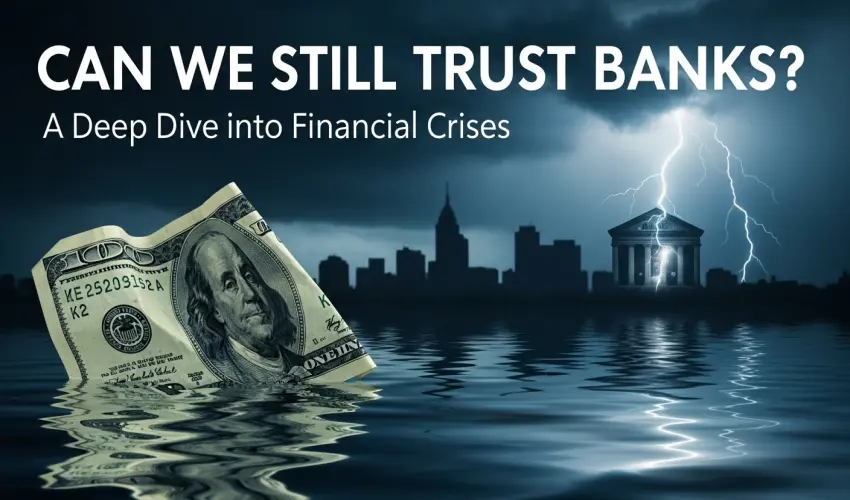Can We Still Trust Banks? A Deep Dive into Financial Crises
Published Mar 10, 2025
1 0
Key Takeaways
-
Trust in banks has been shaken after repeated financial crises, from 2008 to recent collapses.
-
Banking regulations like Dodd-Frank and Basel III tried to restore faith but have their limits.
-
"Too big to fail" institutions still pose systemic risks to the global economy.
-
Recent bank runs and collapses show that consumer trust can vanish in an instant.
-
New threats include cryptocurrency disruption, cyberattacks, and inflation-driven instability.
-
Deposit insurance like the FDIC and government backstops offer protection, but not absolute security.
-
Future trust in banks will depend on greater transparency, tech adoption, and public accountability.
Introduction
Banks have always been at the heart of modern economies. They safeguard our money, provide credit, fuel businesses, and stabilize monetary systems. Yet, every so often, catastrophic failures erode public trust. From the Great Depression to the 2008 financial crash and the recent collapses of major institutions like Silicon Valley Bank (SVB), people are increasingly asking: Can we still trust banks?
This article explores the historical roots, present realities, and future possibilities surrounding the fragile trust we place in our banking system.
1. A Brief History of Broken Trust
Trust in banks isn't a new issue; it has been broken before. During the Great Depression (1929-1939), thousands of U.S. banks failed, wiping out the savings of millions. Fast forward to 2008, and the world witnessed the collapse of financial giants like Lehman Brothers, necessitating massive government bailouts.
Each time, the pattern was clear:
-
Poor regulatory oversight.
-
Excessive risk-taking (e.g., mortgage bubbles, speculative lending).
-
A severe lack of transparency.
-
Herd mentality among investors and depositors.
The outcome? Widespread public distrust, requiring government intervention to save both the banks and the broader economy.
2. How Modern Banks Tried to Rebuild Trust
Post-2008 reforms aimed to stabilize the system and restore faith:
-
Dodd-Frank Act (2010): Introduced stricter oversight on banks, especially those deemed "too big to fail."
-
Basel III Accords: International rules requiring banks to hold higher capital reserves and undergo regular "stress tests."
-
Deposit Insurance: In the U.S., the FDIC insures deposits up to $250,000, offering consumers a crucial safety net.
While these steps helped, trust was not fully rebuilt. Skepticism remained, especially among younger generations who saw their parents lose homes, jobs, and savings.
3. Recent Cracks in the System
Despite reforms, banking failures still occur. The collapse of Silicon Valley Bank (SVB) in 2023 shocked the tech and startup worlds. A classic bank run, triggered by mismanagement of interest rate risks and panicked withdrawals, brought it down. Similarly, Credit Suisse, one of the world’s largest banks, was hastily merged into its rival UBS to avoid a broader European financial disaster.
These failures show that:
-
Bank stability remains fragile.
-
A single spark (like rising interest rates) can ignite systemic fear.
-
Modern technology (online banking, instant transfers) makes bank runs faster and harder to contain.
In short, trust can still evaporate overnight.
4. Emerging Threats to Banking Trust
a) Cybersecurity Risks
Modern banks face constant cyberattacks targeting customer data and national payment networks. A single successful breach could cause not only immense financial loss but a total collapse in confidence.
b) Cryptocurrency and DeFi Disruption
The rise of Bitcoin, Ethereum, and Decentralized Finance (DeFi) offers an alternative to the traditional banking system. While these systems are not immune to scams and hacks, they signal a growing desire to bypass banks altogether.
c) Inflation and Interest Rate Volatility
High inflation and sharp interest rate hikes have created new challenges for banks, including declining asset values and increased default risks. As a result, customers are left wondering: Is my money really safe?
5. The Government's Role in Preserving Trust
Governments and central banks act as the ultimate backstop for the financial system through:
-
Bailouts: While controversial, they are used to prevent domino-like collapses.
-
Emergency Lending: Institutions like the U.S. Federal Reserve provide last-resort funding to stabilize banks.
-
Deposit Guarantees: Insurance schemes protect small depositors from losing everything.
However, this safety net fuels the "moral hazard" problem—if banks know they'll be rescued, they may take riskier bets, undermining trust in the long term.
6. What Banks Must Do to Regain Trust
Banks can no longer rely on their legacy reputations. To earn and keep public trust, they must:
-
Prioritize Transparency: Communicate clearly about financial health and risk exposure.
-
Improve Cybersecurity: Invest heavily in protecting customer assets and data.
-
Adapt to Technology: Embrace blockchain, AI, and fintech partnerships.
-
Focus on the Customer: Promote personalized, accessible, and ethical banking practices.
-
Strengthen Balance Sheets: Prioritize conservative risk management over short-term profits.
7. So, Should You Trust Your Bank Today?
The answer is nuanced.
For everyday needs like paychecks, basic savings, and payments, most banks are trustworthy, especially when your deposits are covered by insurance like the FDIC. For large investments or uninsured savings, greater caution is warranted. Diversification—spreading assets across different banks, brokerage accounts, and even secure digital assets—is more important than ever.
While the banking system isn't perfect, walking away from it completely isn't practical for most people—at least not yet.
Conclusion
Trust in banks is like a delicate glass: once cracked, it can be repaired, but the fissures remain. Financial crises remind us that no institution is invincible. Today's banks face old threats like reckless risk-taking and new ones like cyberattacks and fintech disruption.
Through strong regulation, responsible management, and technological adaptation, banks can work to earn back public trust. As customers, being vigilant, diversified, and informed is our best defense in an uncertain financial world.
So, can we still trust banks? Cautiously, yes. But never blindly.








